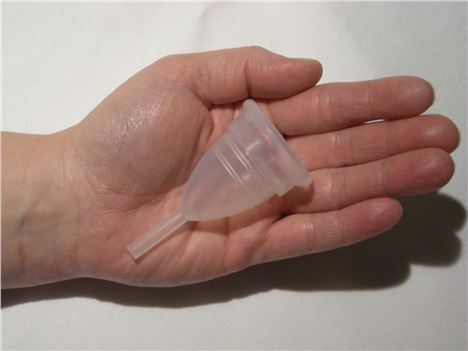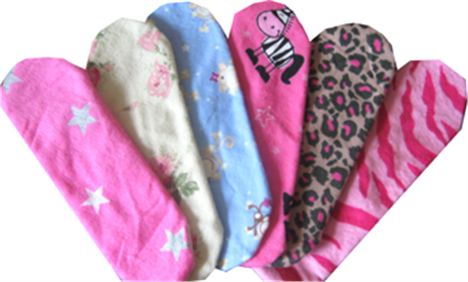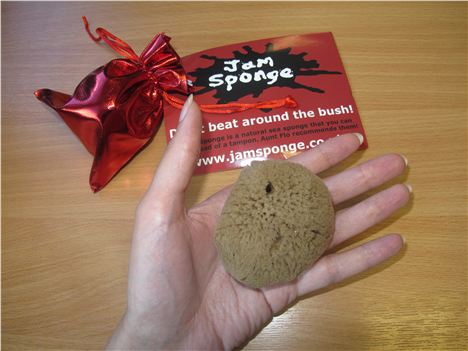“THAT is disgusting” is the overwhelming response to most menstural products beyond the realms of disposable tampons and towels.
And little wonder really. I’m nearly 30 years-old and in all my menstruating years, never have I come across period paraphernalia that doesn’t involve a very white, clean and clinical approach.
Over one weekend the Marine Conservation Society found 30 sanitary product items per kilometre of UK beach surveyed.
Growing up, TV adverts told me ‘it’s my life’ as they dipped a streamlined tampon into a science beaker full of Mediterranean water. A supermodel then took off on her rollerblades to show us just how easy our periods could be.
It was, in effect, a sanitisation of the truth in which we, as women, unwittingly disassociated ourselves from our own bodies via clever marketing campaigns. Unfortunately the reality for many women is probably closer to a Quentin Tarantino movie scene than the idyllic isle that Tampax would have us believe we’re basking on each month.
Periods are bloody. Sometimes a little bloody, sometimes a lot bloody, but always bloody.
The average woman uses around 11,000 tampons and sanitary pads in her lifetime and most of us see it as routine as brushing our teeth. But just because it’s all you’ve ever known, doesn’t mean you don’t have other options.
This week, a new viral ad campaign for reusable silicone menstrual cups, Mooncup (see below), came as a bit of an eye opener to womankind. Not so much because of the ridiculous rap battle but due to the product itself.
It comes in two sizes, A (for women who are 30 and over and all women who have given birth vaginally) and B (for women who are under 30 and have not given birth vaginally). Unlike tampons, the sizes are based on pelvic floor tone, not the heaviness of the menstrual flow. The two inch long cup is folded and inserted into the vagina a lot lower than a tampon. It collects the menstrual blood rather than absorbing it, before being removed, rinsed out and reinserted up to every 8 hours.
Shocked?
Mooncup aren’t shocked that you are. They’ve been on an uphill battle to change women’s perceptions for over a decade. In the Confidential office alone there has been plenty of squirming and shrieking about the idea of it.
Kath Clements, Campaigns and Marketing at Mooncup Ltd, said: “We’re aware that choosing to try the Mooncup takes an open mind and willingness to experiment with a radically new idea: especially bearing in mind that most of us have only known two options, tampons and pads, since our first period.
“While the Mooncup was the first silicone reusable cup in the world (created in 2002), many people are surprised to learn that the concept of a menstrual cup isn’t new at all.
“The first menstrual cup was in fact developed in the 1930s by an American dancer, Leona Chalmers, with her gynaecologist brother, around the same time as the first commercial tampon.”
As we all know, it was the tampon that took off, particularly applicator tampons (66 per cent of tampon purchases in the UK in 2010 were applicator tampons) because, according to Kath they “addressed contemporary issues with touching the vagina - regarded by some as unladylike. The menstrual cup, although adopted by some liberally minded women, struggled to compete with these huge budgets and a culture that associated disposability unequivocally with convenience.”
But as society continues to become more environmentally aware and the supply/demand for all manner of organic and natural products widens, so too does the mindset for Mooncups.
Kath said: “Most sanitary products can dry you out and leave fibres behind. The Mooncup is designed to respect your natural balance. It’s made from medical grade silicone, unlike the cotton in other sanitary products, which can contain bleaches and pesticides, and it’s hypoallergenic. It’s reusable and therefore offers a simple way to dramatically reduce the amount of waste you produce; in the UK alone, 4.3 billion disposable sanitary products are used every year and over one weekend the Marine Conservation Society found 30 sanitary product items per kilometre of UK beach surveyed.”
Body Confidential writer, Thea Euryphaessa's
Mooncup experience
I’ve been using Mooncups for five years. I wanted to reduce my contribution to the sanitary waste mountain. When I first used it, I admit, I was horrified about touching myself, putting my fingers right up inside myself: all that blood – ewww! Which is pathetic really.
Looking back I now see it was yet another way I’d unconsciously accepted our culture’s idea that when I bled, I was ‘dirty’ – hence, our need for ‘sanitary’ wear (this idea, itself, descended from our Judeo-Christian forebears who deemed women ‘unclean’ when they bled and, therefore, ‘untouchable’).
I soon got used to it. It’s just blood – what’s the big deal? And if you find the idea of handling your own blood ‘horrifying,’ you might want to question where you got that idea from.
The only thing is they’re no good for women with a heavy flow. There are days when I still have to wear an organic cotton towel as well (no toxins near me, thanks!), but at least I’ve reduced the waste I dump in the environment.
Interestingly, I’ve noticed most of the women with whom I study Tantra also use them. But we’ve all been initiated into our bodies' ‘mysteries,’ so perhaps we’re just more comfortable with our bodies’ various secretions.
And so begs the question, why aren’t we all burning our tampons and towels in exchange for a safer and more environmentally sound approach to our periods?
Even if you think your periods are enough of a personal battle without having to worry about what impact you’re having on the world, the fact remains a Mooncup holds three times the fluid of a tampon and costs the same as the average woman will spend on disposable sanitary protection in four to eight periods. That’s roughly £2,000 per lifetime for tampon users and £3,500 per lifetime for sanitary towel users. Adds up doesn’t it? Yet most of us will still stick with what we know and the main reason for this comes down to blood. Again.
Most of us don’t want to see it, touch it or smell it, let alone see it in what appears to be a plastic shot glass.
One woman not phased by her own blood, and who is in fact proud of what it stands for, is Rachael Hertogs, owner of organic menstrual product companies, Jam Sponge and Moon Times.
Twenty years ago, Rachael decided she wanted to set up a company for cloth pads after questioning why she insisted on using terry towelling nappies for her newborn baby, yet continued to flush disposable sanitary towels down the loo every month.
Speaking about why more women opt for tampons over her natural sea sponges that work in pretty much the same way as a regular tampon, she said: “It goes back to the whole old fashioned ‘curse’ idea.
“Only a few generations ago women were told periods were dirty and didn’t talk about them. My own mum was horrified when I set up this business. She couldn’t understand why I wanted to make and sell cloth pads, sponges and menstrual cups when tampons had been invented to supposedly make our lives easier and cleaner.
“I do think the majority of women still have that attitude but I’ve also seen a massive change in the last few years and that’s partly down to these alternative products but also projects such as Red Tent where women get together and talk. Once you get women talking about this stuff and they get past the embarrassment you can’t shut them up.”
She’s not wrong. We’re certainly all talking about it this week. However we’re still a long way from seeing a box of cloth pads on the shelves of Sainsbury’s or a Jam Sponge in a nightclub toilet vending machine.
Even the decidedly less hippy-like Mooncup isn’t as readily available as the menstrual products from UK market leaders Procter & Gamble, who were leading the way with a 45 per cent share in 2010 with big sellers Tampax and Always.
Rachael added: “I was on a TV show a couple of years ago called Britain’s Next Big Thing and I was being interviewed by Boots to take on Jam Sponge. They loved it but they said it was too niche. It’s interesting because some Boots stock the Mooncup and some don’t.”
‘Green companies are continuing to make their presence felt in sanitary protection in the UK’ according to market research company Euromonitor International. They’re also referring to brands such as Natracare, which uses solely organic and natural materials in its range of more conventional towels and tampons.
Mooncups and Jam Sponges certainly aren’t going to be for everyone. I still can’t say I’m ready to declare my tampons obsolete, but these alternative methods have given us all something to think about. New and improved ad campaigns such as Mooncup’s may or may not result in many direct sales, but the fact these companies are finally able to get their message to the masses is a job well done.
As Kath from Mooncup said: “Our approach isn’t one of convincing women to use the Mooncup, we just like to make sure that women choose knowing the facts.”
Ultimately it’s for women to decide for themselves about their own bodies. And so long as that’s an informed decision based on the freedom of choice, we can all happily roller blade off into the sunset.
Follow Lynda on Twitter @lyndamoyo














